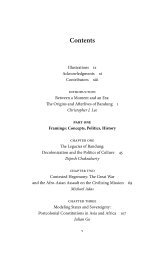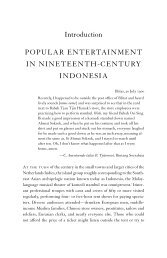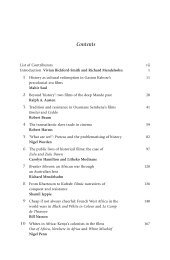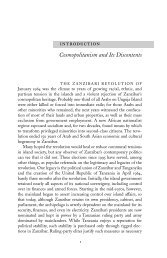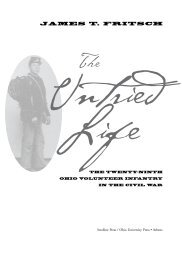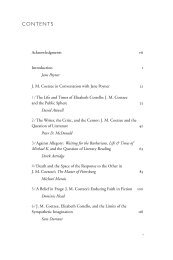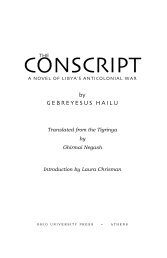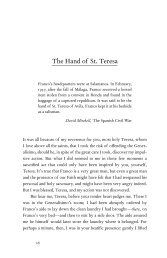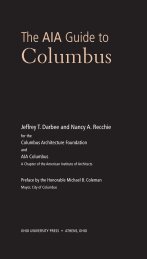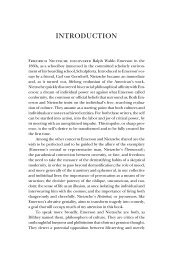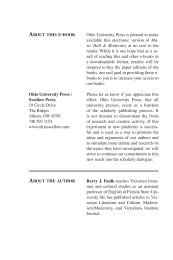Oscar Wilde and Modern Culture - Ohio University Press & Swallow ...
Oscar Wilde and Modern Culture - Ohio University Press & Swallow ...
Oscar Wilde and Modern Culture - Ohio University Press & Swallow ...
You also want an ePaper? Increase the reach of your titles
YUMPU automatically turns print PDFs into web optimized ePapers that Google loves.
A Critical Study contains the following indiscreet assertions: “The letter, a manuscript<br />
of ‘eighty close-written pages on twenty folio sheets,’ was not addressed<br />
to Mr. Ross but to a man whom <strong>Wilde</strong> felt he owed some, at least, of the circumstances<br />
of the public disgrace. It was begun as a rebuke of this friend, whose<br />
actions, even subsequent to the trials, had been such as to cause <strong>Wilde</strong> considerable<br />
pain. It was not delivered to him, but given to Mr. Ross by <strong>Wilde</strong>, who<br />
also gave instructions as to its partial publication” (157). Once he learned of<br />
Ransome’s insinuations, Douglas was indignant. He launched a libel suit against<br />
the publisher, the printer, the Times Book Club of London (which distributed<br />
copies), <strong>and</strong> the author. In 1913, when he stood before the court, Douglas confronted<br />
the fact that much of the work from which Ross had taken extracts was<br />
exactly as Ransome characterized it—a wholehearted rebuke of himself. As<br />
lengthy transcripts in the Times show, the defense read out large sections from<br />
those parts of De Profundis that Ross had suppressed in his edition. Under<br />
cross-examination, Douglas withstood a further barrage in the form of letters<br />
that he had sent to <strong>Wilde</strong>, which Ross had appropriated at the time of their<br />
friend’s death. With such questionable evidence held against him, Douglas had<br />
no chance of a verdict in his favor, even when he revealed from his passbooks<br />
that during the last ten months of <strong>Wilde</strong>’s life he had generously given his friend<br />
“£390 in cheques (in addition to a lot of ready money).”⁷⁹ Years later, in 1925,<br />
Douglas informed Harris that at the start of the Ransome trial he had “not the<br />
slightest idea that it was a letter addressed by <strong>Wilde</strong>” to him—though this is a<br />
claim open to some question.⁸⁰ Douglas, it is worth noting, reviewed the 1905<br />
volume in Motorist <strong>and</strong> Traveller. There he shrewdly remarks, “If <strong>Oscar</strong> <strong>Wilde</strong>’s<br />
spirit, returning to this world in a malicious mood, had wished to devise a<br />
pleasant <strong>and</strong> insinuating trap for some of his old enemies of the press, he could<br />
scarcely have hit on a better one than this book.”⁸₁ He adds, almost as if the<br />
point hardly mattered at all, that “this interesting post-humous book . . . takes<br />
the form of a letter to an unnamed friend.”<br />
Although Douglas lost his case in 1913 (the judge took delight in humiliating<br />
him, <strong>and</strong> the costs were a hefty £1,500), Methuen tried to settle matters by emending<br />
the offending paragraphs in a second imprint of <strong>Oscar</strong> <strong>Wilde</strong>: A Critical<br />
Study.⁸² But there was no smoothing over the conflict. In 1912, in preparation for<br />
the trial, Crosl<strong>and</strong> had access to the manuscript of De Profundis, <strong>and</strong> he quickly<br />
issued an invective in verse, titled The First Stone: On Reading the Unpublished<br />
Introduction 23



